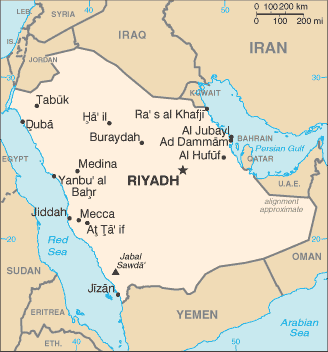|
Saudi Arabia 
The Kingdom of Saudi Arabia is a country on the Arabian Peninsula. It borders Iraq, Jordan, Kuwait, Oman, Qatar, Bahrain, the United Arab Emirates and Yemen, with the Persian Gulf to its north-east and the Red Sea to its west. The Saudi state began in central Arabia in about 1750. A local ruler, Muhammad bin Saud, joined forces with an Islamic reformer, Muhammad Abd Al-Wahhab, to create a new political entity. Over the next one hundred and fifty years, the fortunes of the Saud family rose and fell several times as Saudi rulers contended with Egypt, the Ottoman Empire, and other Arabian families for control on the peninsula. The modern Saudi state was founded by the late King Abdul Aziz Al-Saud (known internationally as Abdul Aziz Ibn Saud). In 1902 Abdul Aziz Ibn Saud captured Riyadh, the Al-Saud dynasty's ancestral capital, from the rival Al-Rashid family. Continuing his conquests, Abdul Aziz subdued Al-Ahsa, Al-Qatif, the rest of Nejd, and the Hijaz between 1913 and 1926. On January 8, 1926 Abdul Aziz Ibn Saud became the King of Hijaz. On January 29, 1927 he took the title King of Nejd (his previous Nejdi title was Sultan). By the Treaty of Jedda, signed on May 20, 1927, the United Kingdom recognized the independence of Abdul Aziz's realm (then known as the Kingdom of Hijaz and Nejd). In 1932, these regions were unified as the Kingdom of Saudi Arabia. The discovery of oil in March 1938 transformed the country economically, and has given the kingdom great legitimacy over the years. Today Saudi Arabia enjoys a close relationship with the many western nations who purchase Saudi oil.
King Abdul Aziz died in 1953 and was succeeded by his eldest son, Saud, who reigned for 11 years. In 1964, Saud abdicated in favor of his half-brother, Faisal, who had served as Foreign Minister. Because of fiscal difficulties, King Saud had been persuaded in 1958 to delegate direct conduct of Saudi Government affairs to Faisal as Prime Minister; Saud briefly regained control of the government in 1960-62. In October 1962, Faisal outlined a broad reform program, stressing economic development. Proclaimed King in 1964 by senior royal family members and religious leaders, Faisal also continued to serve as Prime Minister. This practice has been followed by subsequent kings. The mid-1960s saw external pressures generated by Saudi-Egyptian differences over Yemen. When civil war broke out in 1962 between Yemeni royalists and republicans, Egyptian forces entered Yemen to support the new republican government, while Saudi Arabia backed the royalists. Tensions subsided only after 1967, when Egypt withdrew its troops from Yemen. Saudi forces did not participate in the Six-Day (Arab-Israeli) War of June 1967, but the government later provided annual subsidies to Egypt, Jordan, and Syria to support their economies. During the 1973 Arab-Israeli war, Saudi Arabia participated in the Arab oil boycott of the United States and Netherlands. A member of the Organization of Petroleum Exporting Countries (OPEC), Saudi Arabia had joined other member countries in moderate oil price increases beginning in 1971. After the 1973 war, the price of oil rose substantially, dramatically increasing Saudi Arabia's wealth and political influence. In 1975, King Faisal was assassinated by a nephew, who was executed after an extensive investigation concluded that he acted alone. Faisal was succeeded by his half-brother Khalid as King and Prime Minister; their half-brother Prince Fahd was named Crown Prince and First Deputy Prime Minister. King Khalid empowered Crown Prince Fahd to oversee many aspects of the government's international and domestic affairs. Economic development continued rapidly under King Khalid, and the kingdom assumed a more influential role in regional politics and international economic and financial matters. In June 1982, King Khalid died, and Fahd became King and Prime Minister in a smooth transition. Another half-brother, Prince Abdullah, Commander of the Saudi National Guard, was named Crown Prince and First Deputy Prime Minister. King Fahd's brother, Prince Sultan, the Minister of Defense and Aviation, became Second Deputy Prime Minister. Under King Fahd, the Saudi economy adjusted to sharply lower oil revenues resulting from declining global oil prices. Saudi Arabia supported neutral shipping in the Gulf during periods of the Iran-Iraq war and aided Iraq's war-strained economy. King Fahd played a major part in bringing about the August 1988 cease-fire between Iraq and Iran and in organizing and strengthening the Gulf Cooperation Council (GCC), a group of six Persian Gulf states dedicated to fostering regional economic cooperation and peaceful development. In 1990-91, King Fahd played a key role before and during the Gulf War: Saudi Arabia accepted the Kuwaiti royal family and 400,000 refugees while allowing Western and Arab troops to deploy on its soil for the liberation of Kuwait the following year. King Fahd's action also consolidated the coalition of forces against Iraq and helped define the tone of the operation as a multilateral effort to reestablish the sovereignty and territorial integrity of Kuwait. Acting as a rallying point and personal spokesman for the coalition, King Fahd helped bring together his nation's GCC allies, Western allies, and Arab allies, as well as nonaligned nations from Africa and the emerging democracies of eastern Europe. He used his influence as Custodian of the Two Holy Mosques to persuade other Arab and Islamic nations to join the coalition. King Fahd suffered a stroke in November 1995. Since 1997, Crown Prince Abdullah has taken on much of the day-to-day responsibilities of running the government. Click here to go back to the Middle East Page! This article is licensed under the GNU Free Documentation License. It uses material from the Wikipedia article "Saudi Arabia". |
|||||||||||